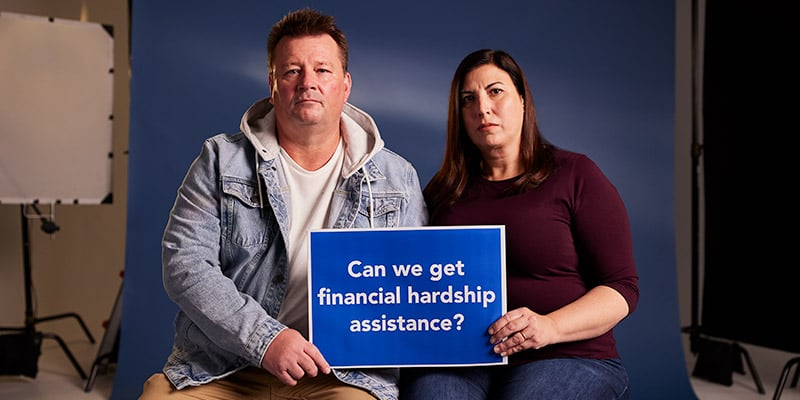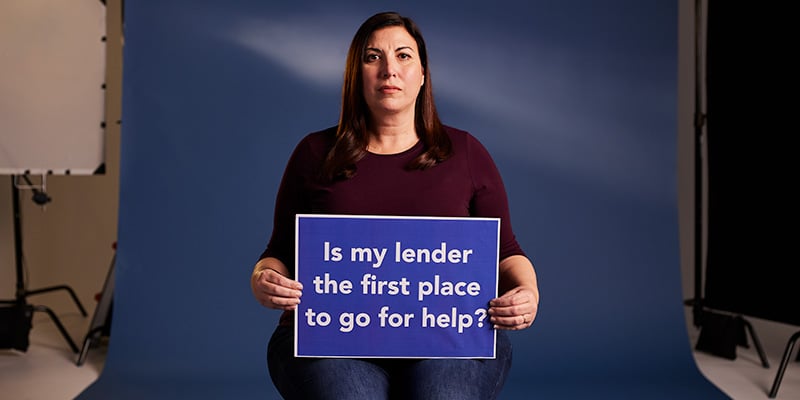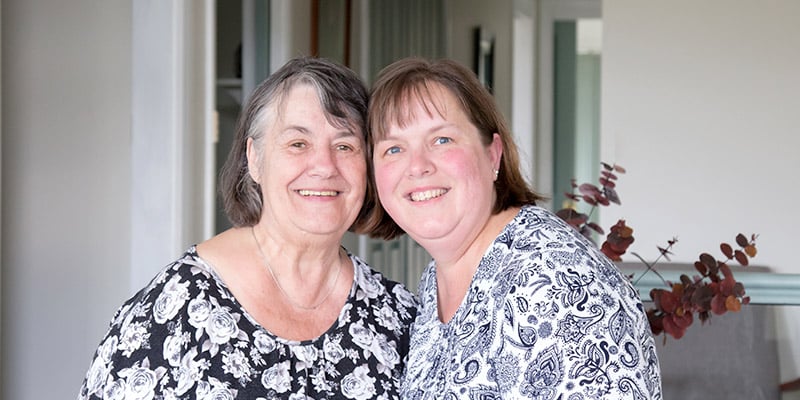Falling behind on repayments can be stressful but you don't have to go it alone. Taking action straight away can stop a small problem from becoming a big one.
Despite struggling to make repayments, according to Moneysmart research 3 in 10 Australians (30%) say they would not seek hardship assistance from their lender or credit provider. More than half (55%) of Australian consumers say they're not aware they are entitled to ask their lender for financial hardship assistance.
If you do experience financial hardship, it's important to know you're not alone. In the 2024/25 financial year there were more than 280,000 hardship notices across Australia. The top 5 reasons people need to claim hardship are:
- overcommitment
- reduced income
- medical reasons
- unemployment
- separation
Here are the answers to common questions you may have about applying for financial hardship assistance. As well as how to ask your lender for help.
Common questions answered
-

What is financial hardship?
Financial hardship is when you are unable to make a credit or loan repayment. Financial hardship assistance can be an arrangement with your lender to alter your repayments or set up a payment plan.
-

Can we get financial hardship assistance?
When you ask for help, your lender must consider you for financial hardship assistance. Your lender will assess your situation and work out what help is available.
-

Is my lender the first place to go for help?
Asking for help may be a bit uncomfortable, but know that your lender is there to assist you. The earlier you seek help, the more options you'll have.
-

Will I have to share my whole life story?
Your lender won’t ask for your life story. Typically, they’ll ask why you’re seeking help, your income and major expenses, and what repayments you can afford.
-

Will asking for help affect my credit score?
A financial hardship arrangement will not affect your credit score. Your credit report will show you have an arrangement in place, but the listing is deleted after 12 months.
-

What if my lender doesn’t help me?
Your lender must give reasons if they refuse your request for hardship assistance. If you're not happy with their response, you can complain.
How to ask your lender for help
Contact your lender
The first step is to contact your lender’s hardship team. Search for ‘hardship’ on your lender's website or:
- to find contact details for your bank, go to the Australian Banking Association’s financial assistance hub
- to find your credit union, mutual bank or building society, go to the Customer Owned Banking Association’s member page.
You can reach out to your lender by phone, email or chat.
When you ask for help, your lender must consider you for financial hardship assistance.
Ask for financial hardship assistance
When you request financial hardship assistance, your lender may ask you for information such as:
- the reason you are experiencing hardship
- your current income and other major financial expenses, such as other loans
- what repayments you can afford
Consider hardship options
Your lender will assess your situation and work out what help is available.
Options can include setting up a payment plan or altering your loan repayments. This is called a ‘financial hardship arrangement’. Your arrangement may be temporary, like deferring a payment. Or permanent, like varying a loan.
Get more help if you need it
If you need help to apply for financial hardship assistance, call the free National Debt Helpline on 1800 007 007. Monday to Friday, 9:30am to 4:30pm. Or live chat, Monday to Friday, 9:00am to 8:00pm.
Aboriginal and Torres Strait Islander peoples can call the free Mob Strong Debt Helpline on 1800 808 488. Monday to Friday, 9:30am to 4:30pm.

Patrick and Maggie felt less alone when they got financial hardship assistance
Patrick and Maggie are raising four young children. Maggie is a stay-at-home mum and Patrick is the sole breadwinner for the family.
The family has always managed financially. But things changed 6 months ago when Patrick was diagnosed with a heart condition and needed to have surgery.
Patrick couldn’t work for 3 months, which put a strain on their finances. They started to have difficulty with weekly expenses and found themselves having to choose between essentials like groceries, fuel, or school supplies for their children.
The turning point came when they had less than $100 in their bank account. Although hesitant, they decided to seek help. They called the National Debt Helpline (NDH).
The NDH put Patrick and Maggie in touch with Claude, a financial counsellor. He helped them to apply for financial hardship with their lender.
'Claude helped to give us breathing room and the motivation to take back control. He provided us with the tools and information to speak to our lender directly. If we knew about this earlier, we would have spent less time worrying and got help sooner.'

Michelle asked the bank for help with her mother's mortgage
Michelle's mother Leigh was recently diagnosed with Alzheimer's disease. When Michelle was helping her to move into a nursing home, she found letters from her mother's bank about missed mortgage payments. To Michelle's shock, the bank had issued a statement of claim. This indicated the bank was taking legal action as her mother was so far behind with payments.
Michelle contacted the bank to explain about her mother's health and to ask for help. The bank was happy to hear from Michelle, as they hadn't had any contact from her mother.
After completing a financial hardship request, the bank offered Michelle’s mother a financial hardship arrangement. Michelle also got some free and independent advice about the bank’s offer from Legal Aid and guidance from a financial counsellor.
Michelle’s experience, though challenging, was positive due to the support she got and the bank’s fair handling of her mother’s situation.
'The bank was very keen to hear our story and I took the time to fill out their forms. I made sure I spelled it all out and told them how their help would make a difference. At the end of the day, what we are after is really some breathing time to fix things.'